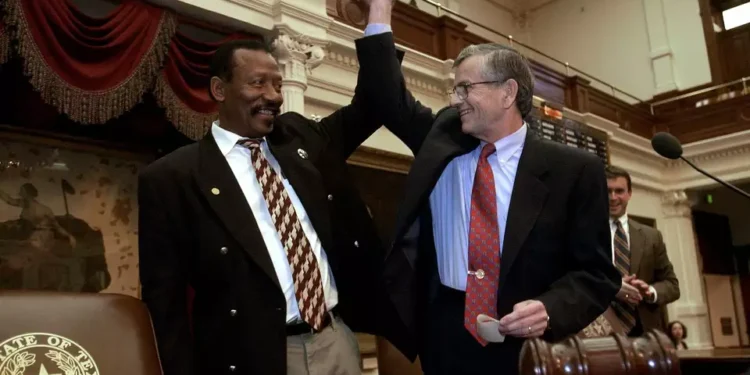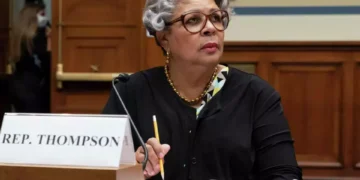June 16, 2025 Story by: Editor
Long before Juneteenth became a federally recognized holiday, Albert Ely Edwards stood alone on the floor of the Texas Legislature, making the case for a holiday that had been celebrated in Black communities for more than a century — but ignored by the state.
In 1979, thanks to his determined leadership, Texas became the first U.S. state to officially recognize Juneteenth, commemorating June 19, 1865 — the day Union troops arrived in Galveston and announced the emancipation of enslaved people in Texas, more than two years after the Emancipation Proclamation.
Today, Al Edwards is remembered not only as the “father of the Juneteenth holiday” but as a pioneering Black lawmaker, civil rights advocate, and deeply principled public servant whose work laid the groundwork for the national reckoning with freedom and delayed justice.
A Life Rooted in Faith, Education, and Service
Born March 19, 1937, in Houston’s historic Fifth Ward, Al Edwards was raised in a community steeped in civic pride and religious conviction. He was one of twelve children of the Rev. A.A. Edwards, a local Baptist minister who taught him the importance of faith, discipline, and community.
After graduating from Phillis Wheatley High School, Edwards earned a Bachelor of Science degree in Biology, with a minor in Chemistry, from Texas Southern University. He would later receive honorary doctorates from institutions including Wiley College, Holy Trinity College and Seminary, and Beulah Baptist Theological Seminary, underscoring his lifelong commitment to education and theology.
Juneteenth: From Cultural Tradition to State Holiday
Edwards made history early in his legislative career. Elected in 1978 to represent District 146 — covering parts of Houston’s inner-city neighborhoods — he introduced House Bill 1016 in 1979 to officially recognize Juneteenth as a Texas state holiday.
“The bill was not just about creating a day off,” Edwards explained. “It was about lifting up a truth that had been buried — that freedom for Black Texans came late, and that delay matters.”
The bill passed both chambers of the Texas Legislature and was signed into law by Governor William P. Clements, making Texas the first in the nation to formally recognize Juneteenth.
At the time, Edwards’ efforts were considered bold. Juneteenth had long been commemorated informally with festivals, picnics, and family reunions in African American communities across Texas and the South, but had no legal status. Through his advocacy, the holiday gained the visibility and legitimacy it had long deserved.
A Legislative Career of Principle
Edwards served in the Texas House of Representatives for nearly three decades, with terms from 1978 to 2007 and again from 2009 to 2011. During that time, he became a respected leader in the chamber and an unwavering voice for social justice, public health, and education.
He served on key committees including Appropriations, Calendars, and Ways and Means, and was a founding and leading member of the Texas Legislative Black Caucus, which he chaired for several terms.
In addition to his work on Juneteenth, Edwards was instrumental in establishing the State Office of Minority Health, securing funding for historically Black colleges and universities (HBCUs), and advancing legislation to improve access to early childhood education and voter protections.
Trials, Resilience, and Continued Advocacy
Edwards’ political journey wasn’t without its setbacks. He lost re-election bids in 2006 and 2010, both times to fellow Democrat Borris Miles. Yet even outside the elected office, Edwards remained active. He founded the Texas Emancipation Juneteenth Cultural and Historical Commission, a nonprofit that worked to educate Texans about Juneteenth and Black history more broadly.
He also continued to speak nationally about the importance of preserving Black heritage and expanding civil rights. “Freedom is not something you inherit. It’s something you must protect, fight for, and teach,” he often told younger audiences.
A Legacy Cemented in History
When President Joe Biden signed the Juneteenth National Independence Day Act into law on June 17, 2021, formally designating Juneteenth as a federal holiday, tributes to Edwards poured in. He had passed away just a year earlier, on April 29, 2020, at the age of 83.
Congressman Al Green of Houston, speaking on the floor of the U.S. House, called Edwards “a drum major for justice” whose legislative foresight created “a roadmap for the nation to follow.”
Though Edwards did not live to see his dream become national policy, few doubted that his vision and persistence made it possible. His early success in Texas proved that state-level action could catalyze cultural and political transformation far beyond state lines.
Remembering a Builder of Memory
Today, the holiday Edwards championed is observed in all 50 states, with parades, concerts, educational events, and readings of the Emancipation Proclamation. Every celebration bears his imprint.
But his legacy is about more than a single date. It is about the power of memory as resistance, about the right of a people to be seen, heard, and remembered on their own terms.
In honoring Juneteenth, Al Edwards expanded the American story — adding to it a chapter that refuses to forget the realities of slavery, the delay of freedom, and the resilience of Black communities.
“Juneteenth is not a Black holiday. It’s an American holiday,” Edwards once said. “It is the completion of the promise of liberty. And that promise must never be forgotten.”
Sources: Houston Chronicle / Houston Public Media / House Bill 1016

















